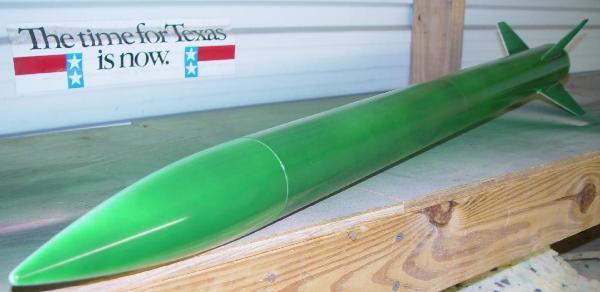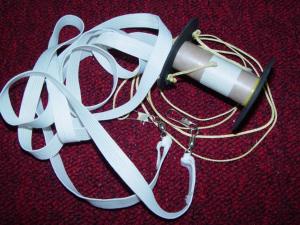| Construction Rating: | starstarstar_borderstar_borderstar_border |
| Flight Rating: | starstarstarstar_borderstar_border |
| Overall Rating: | starstarstar_borderstar_borderstar_border |
| Diameter: | 2.60 inches |
| Manufacturer: | The Launch Pad  |
| Style: | Scale |
Brief:
This is a single stage rocket, nice sized, over 3 feet tall. Skill level (2), being the most simple kit offered by The Launch Pad. It comes in a large retail type (Estes type) plastic bag with a peg hole punched header card and a full color cardboard insert which looks very nice. I purchased this kit and two other Launch Pad kits (the two others being the HARM and ALARM) at the same time, to get a good experience with their kits. They seem to be all military scale and similar in difficulty. But this one looked to be most simple, so I built it first. (See Picture - Type 30 Painted Green)

Construction:
While this kit does not include a list of parts, everything was there and perfect to get started. The instructions are quite nice with illustrations and by using them you are walked through very concise and detailed, yet simple steps to make this rocket a nice reality. It comes with two body tubes (2.6), plastic nose cone, balsa fin stock (very flexible), engine tube, clip, rings, very thin body tube connector, engine mount centering ring type parachute compartment bulkhead ring, highly reflective Mylar chute material and what is needed to assemble it, and templates for a paper nose cone extension, fins, etc.
Overall the kit looks nice, the instructions are simple and complete (other than the fact that they do not tell you where to mount the launch lug), and I enjoyed building this. I only have one concern, and that is that the balsa fin stock is very, very soft. The balsa fin stock provided is so soft that it could be used to fold or roll in applications such as making RC airplane wings. I had read reviews before about how soft the balsa is in The Launch Pad kits, so I was not let down. But I was surprised as I never expected it to be THIS soft. There is no way in the World that you could use this Balsa fin stock as is and expect reliable repeat flights. As it is, an E could shred the fins apart. I sanded the glassine off the body and tacked the fins which I cut and sanded to be uniform, with quick CA. I then used DAP yellow wood glue for fillets. But that does not matter. You can still use your pinky and next to no pressure and the fins are so soft that they move a lot. The instructions do not give any warnings or directions on how to make the fins stronger. So as the kit is, this looks nice, but it is ready to come apart, without more attention than the kit instructions detail.
The instructions are quite good. I have built a few rockets in my time, so for me, they were perfect. But this is not a kit for someone who has never built a rocket.
The engine tube centering rings as well as the same type ring which is used to create the parachute compartment, are very nice quality black stiff cardboard.
A thin paper/cardboard nose cone tip was provided, along with instructions on how to add it to the plastic nose cone. I decided to opt out of this myself. I would prefer a nice correctly shaped balsa nose cone, but that is just a personal preference.
As a PRO, the parachute compartment created with a thick black thin cardboard centering ring is a major plus and nice touch. A shock cord could even be mounted to it.
A CON is that the Balsa fin stock is way, way too fragile.
Finishing:
This is a quite easy rocket to build and finish. I decided to skip any primer. It does not come with decals of any type, but that is no big deal as the prototype that it models didn't really have any major marks other than a few stripes. I used FIX-ALL All Purpose spray enamel, gloss green. It's hard to spray paint in Houston because it is so humid and my rocket shop is an outside metal building. I have a few paint runs, but not that bad. The rocket looks very nice. I just wish I felt confident with it
. The main thing that worries me about this rocket is how soft and flexible the fins are. I will build another one, using my own Balsa wood fin stock. This is a great kit, nice sized rocket easy to build, but I can only give it a 2/5 as the Balsa fin stock is below average and there could be major improvement there. I used yellow DAP wood glue and CA for the entire build.
Construction Rating: 2
Flight:
I put it up once, unpainted on an Estes D12-5. Slow lift-off, then some boost. Looks like it got about 400 feet. Ejection right at apogee, looked nice. Soft landing, no damage. It tore one fin off right above my yellow wood glue fillet, right into flight. It got majorly sideways and did not fly like anything I would want to put up at a club launch. Glad I was by myself on this one. I am not at all surprised to see it shed a fin as the fin stock was so weak that the fins were almost falling apart while being cut out.
 Recovery:
Recovery:
This kit suggests using an Estes type paper tri-fold shock cord mount, mounted to the inside of the body. But it is set up for way better methods, for those who want to enhance the recovery system. I used a two foot long piece of 1/8 Kevlar Cord, mounting each end through the top ring of the engine assembly centering ring, creating a loop, with a knot about an inch from the top. (see picture) This results in (2) cords which are supposed to be fireproof. An exacto knife was able to make nice slits in the top centering ring, and the knotted ends got a drop of CA each. The knot about 1 inch from the top will ensure that if one fails, the other will work.
I then added the snap swivel, which came with the kit, to connect the chute quickly. I then added 15 feet of my own 1/2" elastic shock cord instead of the 18"x1/8" that came with the kit, to extend to the nose cone and chute snap swivel. The Kevlar loop is designed to fall short of the top of the body by 1 inch, including the snap swivel. This causes the only body contact to be with the 1/2" elastic, thus almost entirely eliminating any chance of a zipper like damage event to the body, even in the case of a very late ejection and deployment.
On an interesting note, when looking at the three Launch Pad kits I have, now two to finish, it appears as if they all come with a very shiny Mylar parachute which must be put together. What is funny is that this rocket designed to be green, came with a purple chute. Then the ALARM designed to be red, came with a green chute. The HARM, designed to be white came with a red chute. So I just switched them out, and used the green chute from the HARM with this Type 30, which is green as well, and will use the purple chute with the Harm/White and the red chute with the Alarm/red.
While I do not care for the Estes type paper tri-folded shock cord mount system, it will work for this kit and the parachute is of good quality when built right. Nice reflective mylar. It was only a personal choice to add my own Kevlar to the mount system. (See pictures 1 and 2) Here, due to fin failure only, in flight, I give it a 3/5. If the fins were strong I would have gave it a 5/5.
Flight Rating: 3
Summary:
This is a nice sized rocket kit that comes in a professional package with everything you need, along with good instructions. What scares the heck out of me is that the Balsa wood for the fins is just very weak and limp. When I finish a model and have my thumb on the button to launch it, I like to feel confident about everything. With this one, I can't feel confident at all, and it really does scare me to think of how weak these fins are. So for overall rating, considering what is most important to me, I can only give this kit a 2.5/5. It needs better balsa to become average, but with that it makes a big jump. If it had stiff and strong balsa, I would have most certainly have given it a 5/5, cause it's a cool, fun and complete kit.
Overall Rating: 2
Other Reviews
- The Launch Pad Type 30 By Darren Collins
( Contributed - by Darren Collins) Brief: One of the larger scale kits by The Launch Pad. Listed as a skill level 2, but I think this is the easiest level this company makes. Construction: Packaging was good. No damage. All parts fit okay. I coated the balsa fins with thin C.A. glue as suggested after cutting them out. This caused them to warp a little, but I was able to hold them ...
- The Launch Pad Type 30 By John P. Jordan
Brief: The Launch Pad's Type-30 Artillery Rocket is a good introductory kit to mid-power rocketry. It's fairly easy to build and it flies great! Introduction: After launching model rockets with my eight year old daughter for some time we learned that the smaller the rocket the harder it is to find after each flight. Our most successful rocket was Big Bertha, which was easy to find and ...
 |
 |
Flights
 |
 |
M.A. (June 14, 2009)
Charlie Moss (June 8, 2015)
I bought and assembled a Type-30 kit last year (2014) and must say that I fully agree with Mr. Deeter about the poor quality of the fin stock. Instead of using the material provided I fabricated my own fins from good 1/8 inch balsa stock. I was also concerned about the flimsiness of the motor tube included with the kit so I constructed a stronger one from BT-50 body tubing. Becuse the 3/16" launch lug material seemed pretty weak I decided to use a pair of Estes 1/4" lugs instead. That idea of making a paper cap for the nosecone is a joke so I left the nosecone as is. The ultra light mylar for the paracute broke through as I was tying on the shroud lines. Luckily I had a spare parachute on hand to replace the one in the kit. After having made these modifications I found this rocket flew quite well with an E18-7W RMS or an E20-7W single use motor. Although the construction process is pretty simple and straight forward I wouldn't recommend this kit for a novice since one needs to have had some experience in rocketry to understand what needs to be done to make the Type-30 a decent rocket.
 |
 |
A.J. (December 7, 2002)